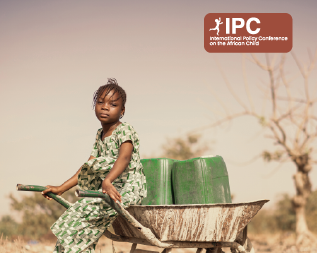Experts have warned that Africa’s children under threat from climate crisis.
Child rights campaigners are warning that the climate crisis in Africa undermines the rights of children to life, health, education and security – whilst increasing the risks of violence, exploitation and displacement.
In sub-Saharan countries, 490 million children in 35 sub-Saharan countries are at risk of the worst climate change impacts. At least 11 million children across the continent face food insecurity due to extreme weather events including drought and floods.
More than two hundred child rights experts, civil society organisations, academics and high-level United Nations and African Union officials meet in Addis Ababa Ethiopia today [Sept 6] for the start of the Ninth International Policy Conference (IPC). They will be joined by government ministers from some of the African countries most vulnerable to climate risks – including Ethiopia, Gambia, Malawi, Mozambique, Sierra Leone, South Sudan and Zambia.
The conference aims to put Africa’s children at the centre of the climate agenda and calls for urgent and greater efforts to prevent and respond to the effects of climate change on African children.
“Half of Africa’s population is under the age of 20. They are the ones who will suffer most from extreme weather events and climate-related disasters, from the long-term impacts of increased poverty, lack of investment and inadequate infrastructure,” said Dr Joan Nyanyuki, Executive Director of African Child Policy Forum (ACPF), which organises and hosts the IPC. “The climate crisis is a major child rights crisis in Africa and could reverse the progress made so far.”
#ClimateChange #IPC2022 @_AfricanUnion @acerwc @UNICEF @UNICEFAfrica @G_MachelTrust @PlanGlobal @ibrahimthiaw @MamaFatimaS @UN_EndViolence @save_children pic.twitter.com/jGpJTRoAVc
— African Child Policy Forum (ACPF) (@AfricanChildFrm) September 6, 2022
According to recent analysis, Sub-Saharan Africa accounts for 35 of the 45 countries globally at the highest climate risk. Chad, Central African Republic, Somalia, Eritrea and the Democratic Republic of Congo are the African countries least capable of adapting to the impacts of climate change.
Angola, Eswatini, Lesotho, Madagascar, Malawi, Mozambique, Namibia, Zambia and Zimbabwe are home to more than 11 million people, including children, who experience food insecurity caused by drought and flooding. According to the UN Intergovernmental Panel on Climate Change (IPCC), by 2100, increased temperatures could increase children’s malnutrition in Western Africa by 37 percent and in Central Africa by 25 percent.
“By 2050, Africa will be home to one billion children and young people who, given the right life chances, could power the continent’s social and economic renaissance. But they face a future of reduced employment, productivity and growth due to the economic impacts of climate change,” said Mrs Graça Machel, Chair of the ACPF Board of Trustees.
“Children and young people in Africa face a double-whammy from climate change,” added Mrs Machel. “They face more floods, droughts, food and water shortages, whilst at the same time, investment in essential children’s services could be diverted to pay for climate adaptation. African children and young people are bearing the brunt of climate change now, and will continue to do so in the coming decades.”
“The already heavy burden of malnutrition and disease among children in Africa is exacerbated by increasing drought, poverty, high food prices, displacement and insect outbreaks that are all related to extreme weather events,” said Dr Nyanyuki. “Climate change has a negative impact on the survival rate, development, growth and mental health of children in Africa – and girls and young women are especially vulnerable. The majority of children live in families and communities that have little resilience to respond and adapt to climate-induced emergencies.”
“Extreme weather events and rising temperatures lead to knock-on effects for African children such as increased poverty, child labour, severe malnutrition, lack of access to clean water, health and sanitation facilities, child marriage and school drop-out. African governments urgently need to step up their financial investment and economic policies to prevent and respond to the effects of climate change on African children,” she added.
Have #African governments met their obligations to #Children regarding #ClimateChange?Join us to investigate impact of #ClimateChange on #ChildRights & state accountability in response to policies & actions#HumanRights #food #water #protection #health #education #EndViolence pic.twitter.com/AfUrx39U7X
— African Child Policy Forum (ACPF) (@AfricanChildFrm) August 31, 2022
About the International Policy Conference
The Ninth IPC Climate change and children’s rights in Africa: impact and accountability takes place in Addis Ababa, Ethiopia, September 6-7. Media are warmly invited to attend either in person or online: for more details and to register, please go to www.africanchildforum.org/ipc
About ACPF
African Child Policy Forum (ACPF) is an independent, not-for-profit Pan-African centre of policy research and advocacy on the African child. It was established in 2003 out of concern about the situation of the African child and the need for Africans to recognise their responsibility to collectively ensure the realisation of all rights to all children.


